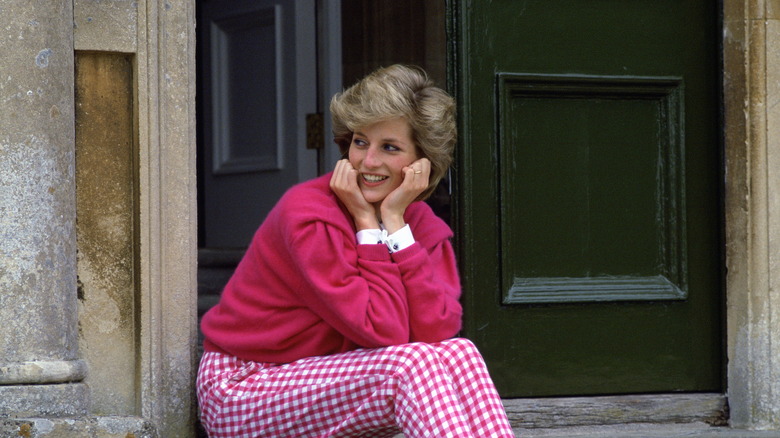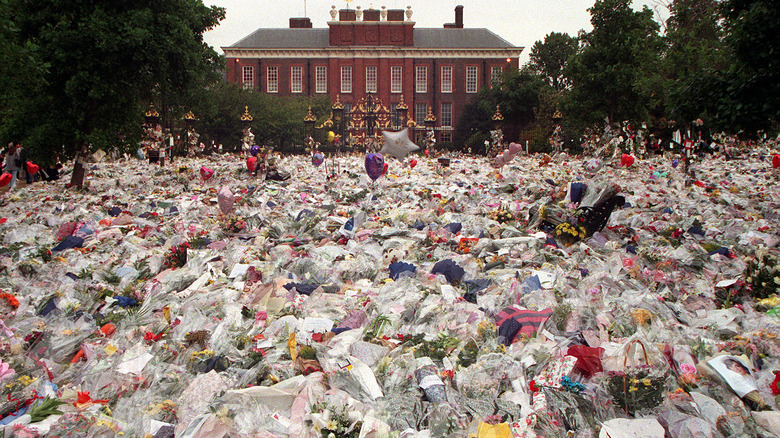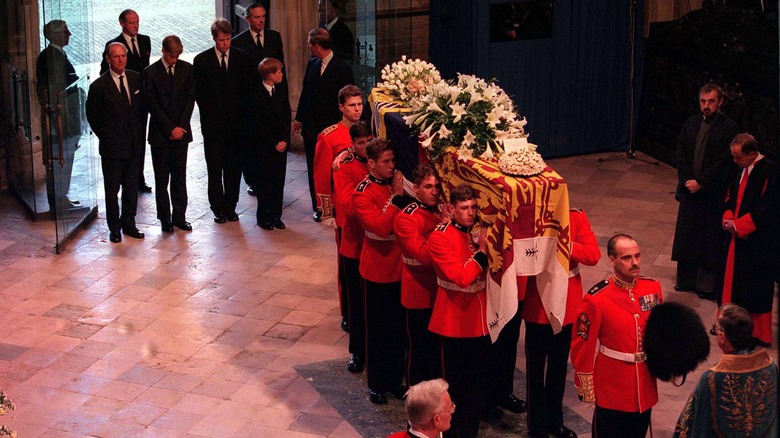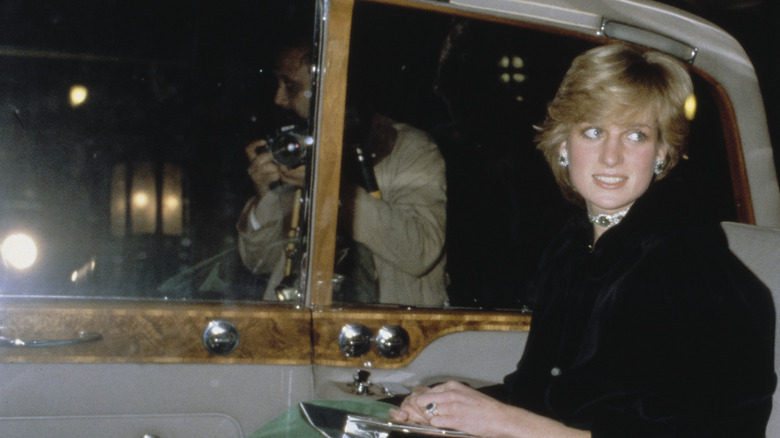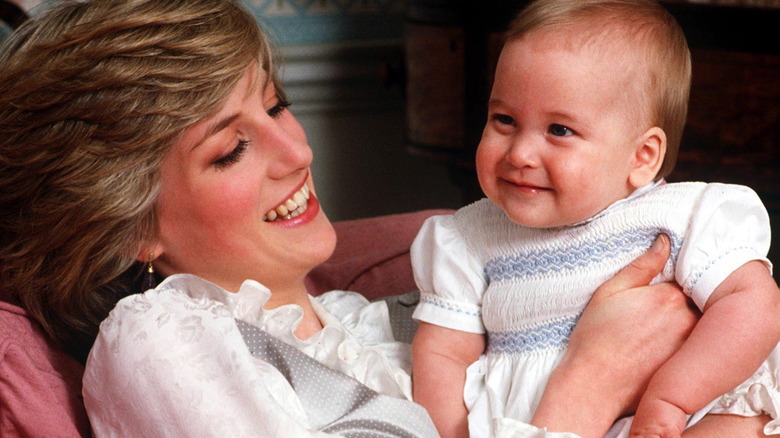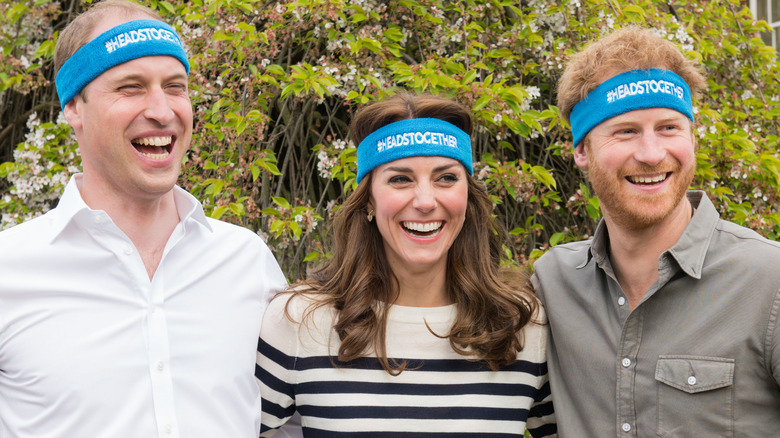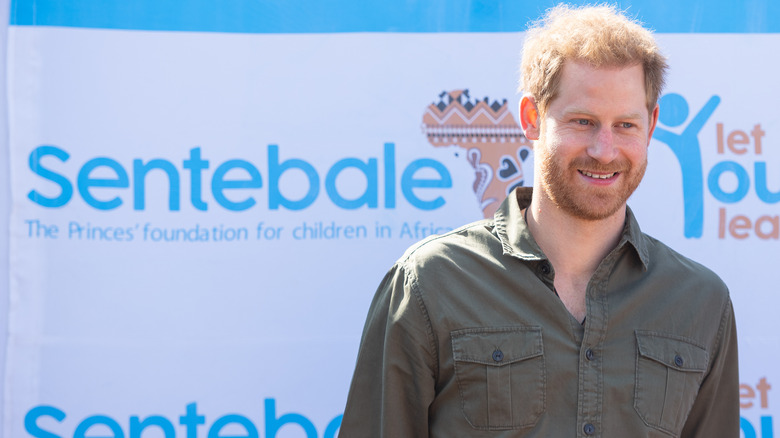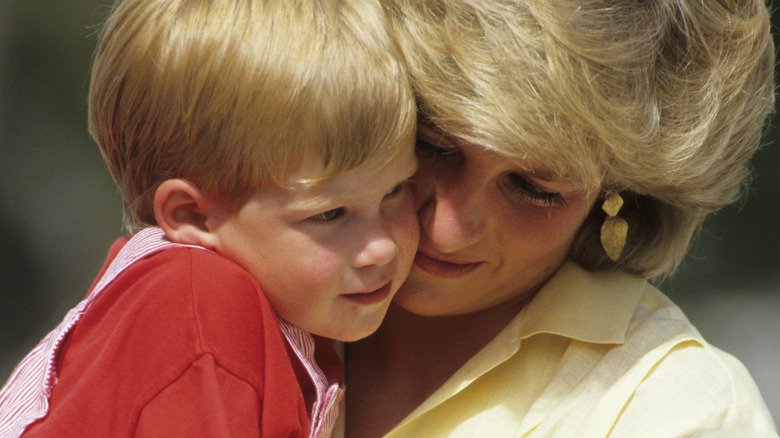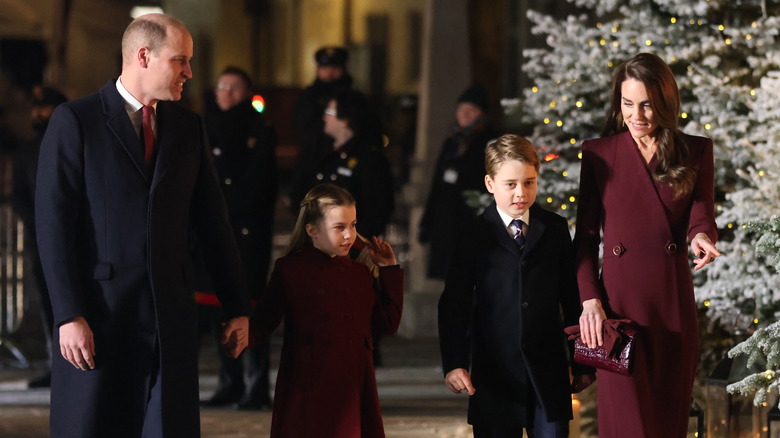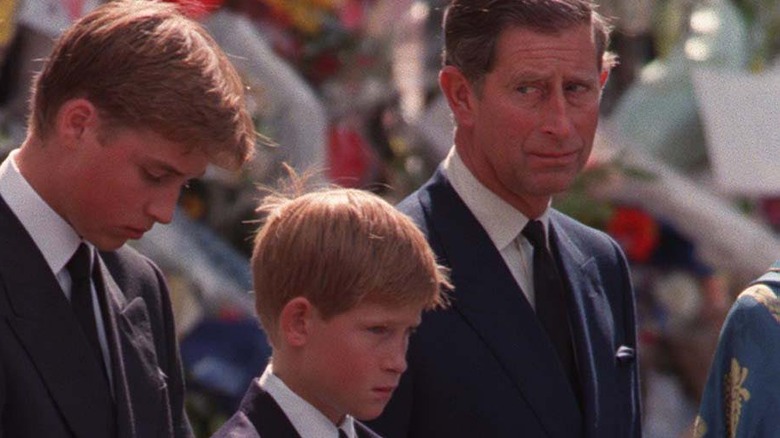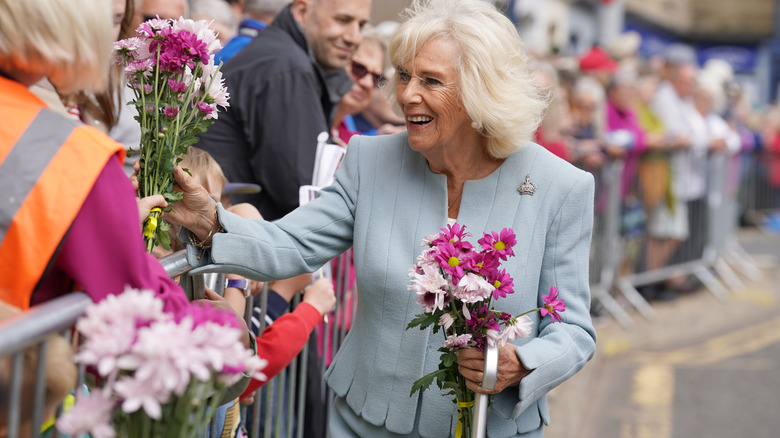How Princess Diana's Death Changed The Royals
Everyone who lived through the assassination of John F. Kennedy remembers where they were and what they were doing when they heard that the president had been shot. For the next generation, that earth-shattering death was the August 31, 1997 passing of Princess Diana. The story is well-known: Being harassed by paparazzi on motorcycles, a panicked chase through the streets of Paris led to the fatal car accident.
Tony Blair was the newly installed prime minister of the United Kingdom, and even as he shared his grief with a mourning nation, outrage brewed. The paparazzi and the media were condemned for what happened, and the media demanded that the royal family show a little more emotion than the stiff upper lip that had become their trademark. Queen Elizabeth in particular was targeted for her perceived indifference to the death of her former daughter-in-law, and it only came out later that when then-Prince Charles went to France to escort her home (alongside her sisters), he did it against his mother's wishes, ABC News reported.
The world mourned, the family mourned, the media threw fuel on the fire, and the deep chasm that separated the royals from their people only grew deeper. The specter of Diana's death has continued to linger over the royals, and over the years, the royal family has been drastically and forever changed. Let's take a look at how individual members and the family as an entity has dealt with the events of that ill-fated summer night.
The monarchy has become more open about grieving with the nation
Immediately after Princess Diana's death, Queen Elizabeth famously remained in Scotland with Diana's two sons. Although the royals would later say that the decision gave William and Harry a chance to process the news in private, it didn't go over well with a nation that viewed the move as little more than indifference.
When Queen Elizabeth died in 2022, the response from the royal family was very different — and the very public mourning was a sharp contrast to the royal response to Diana's death. Instead of retreating into private grief, William, Harry, Charles, and Camilla circulated through crowds of mourners and accepted condolences face-to-face. Royal biographer Robert Lacey explained to Reuters how attitudes that were once seen as unbecoming were now reinforcing the people's love for their monarchy: "Charles always has been a more emotional person, worn his heart on his sleeve, much more than his mother, and he's been criticized for it. Well now, heart on the sleeve, emotions of mourning and dedication, he's conveyed those very well."
This updated public mourning echoed the queen's later bow before Diana's funeral carriage, and Eamonn McCabe, a former editor for The Guardian, explained it like this (via Reuters): "My view is that when Diana died, the queen suddenly got into people's psyche as the sort of mother of the country. It's a sad thing to say, but I think it took Diana's death to get the queen out there to represent everybody."
They learned a very important lesson about public opinion
In a (now removed) article, Time Magazine declared that the British monarchy had learned a very important lesson in the days following Diana's death. Simply put, they learned that their position wasn't a guarantee, that they weren't invincible after all, and there were things that could turn public opinion against them.
Polls taken in 1969 and 2007 suggested that for the most part, about 18% of the British population believed that the country would be better off without the monarchy. But in the weeks surrounding Diana's death, the less-than-stellar response from Buckingham Palace sent their approval rating downhill: About 25% of people were in favor of abolishing the regime (via Ipsos).
The BBC quoted one royal official as explaining the queen's shift from distant to leading a public display of sorrow: "She relented. I was surprised." It was a move, they add, not only designed to pay tribute to one of their most beloved members but also to try to heal public opinion of the royal family. The week after Diana's death was often said to be one of the most questionable of Elizabeth's reign, and that's saying a lot for a monarchy known for its steadfast nature. In other words? There was a bit of self-preservation there, and moving forward, the monarchy realized that public opinion is important.
They were granted more protections from the media
The world remembers how Princess Diana's story ended, but what about the paparazzi who were chasing her? It's just as important to remember that although public opinion clearly believed the paparazzi to be in the wrong, and they were arrested, they were ultimately found not responsible — each person was fined a symbolic single Euro as a penalty for invasion of privacy.
At the time of Charles and Diana's wedding, a single good photo of her could be sold to the tabloids for as much as $656,000. Diana sued — once, in 1993, for photos taken while she was working out at a gym — and settled because at the time, the royals had little to no recourse or right to privacy. As a consequence of Diana's death, privacy laws that were introduced that same year were beefed up — and then, went even further.
The use of long-range lenses and photos on private property became illegal, and more laws were enacted to protect the privacy of high-profile children. Mike Dodd, a Press Association law specialist, explained to Time that those laws were "introduced simply because of the way in which Harry, and particularly William, were being pursued while they were at school." Just how well lessons have been learned is debatable, as paparazzi continue to stalk figures like Prince George and Princess Charlotte. Nevertheless, the royals have been lauded for embracing social media, releasing their own photos, and learning to control — or at least guide — the narrative.
She created a more personable, approachable generation of the monarchy
It's impossible to tell what kind of princes William (pictured) and Harry would have turned out to be had they not lost their beloved mother on that tragic August night. Yet we can look at how they embraced the lessons they learned not only from her life but from her death.
Diana was christened "the people's princess," and touched countless lives — literally, especially when she famously not only met with AIDS patients but greeted them with hugs and handshakes at a time when there was still a seemingly insurmountable stigma against them. William and Harry grew up watching that during their formative years, but the Associated Press argues that just as eye-opening was the public outpouring of grief at her death. Everyone in Britain — and countless others across the world — felt as though they had lost their princess, and it was those final gestures that really demonstrated what her kindness had meant to so many.
Sally Bedell Smith is a royal historian who described Diana's death as the moment that surviving royals took a step back and really looked at their actions, their relationship with the public, and how their own inevitable passing would be received. "I think [Diana's] legacy was something that the queen in her wisdom [sought] to adapt in the early years after her death," Smith explained to the Associated Press. "The queen was more likely to interact with people, and I think you see the informality magnified now, particularly with William and Kate."
Diana's death paved the way to open conversations about mental health
Conversations about mental health are becoming more common, and leading the charge to try to normalize that in the notoriously stoic Britain are members of the royal family. In 2019, Prince William opened up about how dealing with his mother's death left him struggling — and realizing the importance of mental health.
"I've thought about this a lot, and I'm trying to understand why I feel like I do, but I think when you are bereaved at a very young age, any time really ... you feel pain like no other pain," he said (via the BBC). He continued, saying that his time working as an ambulance pilot was incredibly difficult: "That raw emotion... I could feel it brewing up inside me and I could feel it was going to take its toll and be a real problem. I had to speak about it."
Diana herself had made very public statements about mental health, long before it was a trending topic. In addition to the conversations that were turned into her autobiography, "Diana: Her True Story," she publicly said in 1993 (via Healthline): "Isn't it normal not to be able to cope all the time? ... Perhaps we need to look more closely at the cause of the illness rather than attempt to suppress it." There's no question as to whether or not she would be proud of the charity Heads Together, launched in part by her sons.
William and Harry's charitable efforts became a memorial for their mother
Both William and Harry have spoken about how their choices of charities have been deeply influenced by their mother's memory. In 2016, Harry told People, "When she died, there was a gaping hole ... I will have to, in a good way, spend the rest of my life trying to fill that void as much as possible. And so will William."
Diana famously broke down barriers when she was photographed embracing AIDS patients, and Harry followed that with the 2006 establishment of his charity, Sentebale, in support of children living with HIV/AIDS in Lesotho. At a charity polo match in 2022, he thanked the crowd and reiterated Diana's commitment (via GMA): "She was tireless in her work to support and destigmatize those experiencing HIV and AIDS. I hope we can remember my mother's legacy by recommitting to those that we serve."
Meanwhile, William has become a patron of several charities that support the homeless, including Centrepoint and The Passage. When he was announced as a Royal Patron of the latter, he spoke about the impact his 1993 visit with his mother had on him. "The visits I made as a child to this place left a deep and lasting impression on me — about how important it is to ensure that everyone in our society, especially the poorest, are treated with dignity, respect, and kindness," he said (via People). In 2020, the brothers decided to split the proceeds from Diana's memorial fund between charities of their choosing.
Harry has been candid about the lasting impact of his mother's death
In 2023, Prince Harry sat down for an interview with ITV and talked about how he remembered greeting mourners: "I cried once, at the burial, and ... there was some guilt that I felt, and I think William felt it as well, by walking around the outside of Kensington Palace. There were 50,000 bouquets of flowers to our mother, and there we were, shaking people's hands and smiling."
In 2021, Harry appeared on Apple TV's "The Me You Can't See," where he shared the lasting trauma of his mother's death and the feeling that he was unable to mourn her (via The Guardian). He recalled his father telling him, "'Well, it was like that for me, so it's going to be like that for you,'" and not agreeing with that at all. "I've got a hell of a lot of my mum in me," he said. "The only way to free yourself and break out is to tell the truth."
Harry also said that the unattended trauma of the loss of his mother was what pushed him down a road of drugs and alcohol. "I was willing to try and do the things that made me feel less like I was feeling," he said, adding that he spent years suffering from panic attacks. It was a combination of all of it that aided in his decision to turn his back on the royal family: "Certainly now, I will never be bullied into silence."
Diana's death led William to change the narrative for his own children
Losing a beloved parent changes a person — so deeply that it might take years to process. In 2017, Prince William sat down with GQ to talk about the long-lasting impact that the death of his mother had on him. When he was asked about whether or not he had time to grieve during the public period of mourning, he replied, "Probably not properly. I was in a state of shock for many years. ... when you lose something so significant in your life, so central, I think the shock lasts for many years."
He was candid, too, about the necessity of having to continue to be a very public persona while hiding what he was really struggling with. And he knew that it wasn't fair. "I am determined to protect myself and the children, and that means preserving something for ourselves. I think I have a more developed sense of self-preservation," he said.
He's also spoken about how learning of the death of his mother while in Scotland has connected him to the nation in a way that he never expected. In 2021, he spoke at the General Assembly of the Church of Scotland (via People) and shared that his love for the nation came from it being an integral part of the best and worst in his life: It was his mother's death, the solace he found in the Scottish countryside, and finally meeting Kate Middleton.
Charles had to step up to be a father — and it made him more popular
After King Charles III was coronated in 2023, Ipsos polling found his satisfaction rating was sitting at a comfortable 63% (while William's was an even higher 73%). That's telling: Prior to Diana's death, Charles was not a well-liked figure.
In 2002, ABC News reported that the polls had swung in Charles' favor after years of being caught up in the scandalous headlines that shared the sordid details of his relationship with Camilla Parker Bowles and ridiculed him for his complaining biography. Bournemouth University research fellow Rob Turnock summed the situation up succinctly — "He's certainly been rehabilitated" — and it started with his reaction to Diana's death. Going to France to escort her body home earned him major points — and so did his stepping up to take a more hands-on role with William and Harry.
It was Harry who lauded his change in parenting styles in "Diana, 7 Days," saying, "[Charles] was there for us — he was the one out of two left, and he tried to do his best and to make sure that we were protected and looked after. But he was going through the same grieving process as well." Those outside the family saw, too, with Lady Julie Montagu giving him credit due. In "The Queen and Prince Charles: Mother and Son," she observed (via Marie Claire). "He really stepped up in that parenting role when he needed to."
Camilla's fight for public acceptance
It's easy to forget how hated Camilla was: When Charles and Diana's marriage fell apart, it was the woman Diana called "the Rottweiler" who earned the public's wrath. That same public had a number of opinions about what should happen to her, from banishing her from Britain to refusing to give Charles the crown if he married her. Some, reported Reuters, even blamed her for Diana's death.
But by 2022, Camilla's popularity had skyrocketed. A YouGov poll gave her about a 53% approval rating (via News24), and that rating had steadily risen in the prior years as she stepped more and more into the public light. It wasn't an overnight journey, and it started when she stepped back from the limelight — and vanished from Charles' side, at least in public — after Diana's death. It took a full two years before Charles and Camilla partnered with a PR expert to slowly re-introduce her to the British public, and bit by bit, those who knew her came to see her as an earnest, thoughtful, and steadfast partner for a future king.
Diana's shadow always loomed over Camilla's shoulder, especially with the announcement that when Charles would be crowned king, Elizabeth II wanted her to remain "Queen Consort Camilla." University of New Hampshire associate professor of British history Nicoletta Gullace told NPR that a single word — consort — reminded everyone of a certain level of illegitimacy attached to her reign and said it wasn't surprising that she became Queen Camilla when the coronation came.
If you or anyone you know needs help with addiction issues, help is available. Visit the Substance Abuse and Mental Health Services Administration website or contact SAMHSA's National Helpline at 1-800-662-HELP (4357).
If you or someone you know needs help with mental health, please contact the Crisis Text Line by texting HOME to 741741, call the National Alliance on Mental Illness helpline at 1-800-950-NAMI (6264), or visit the National Institute of Mental Health website.
